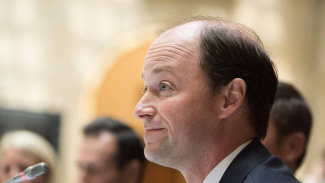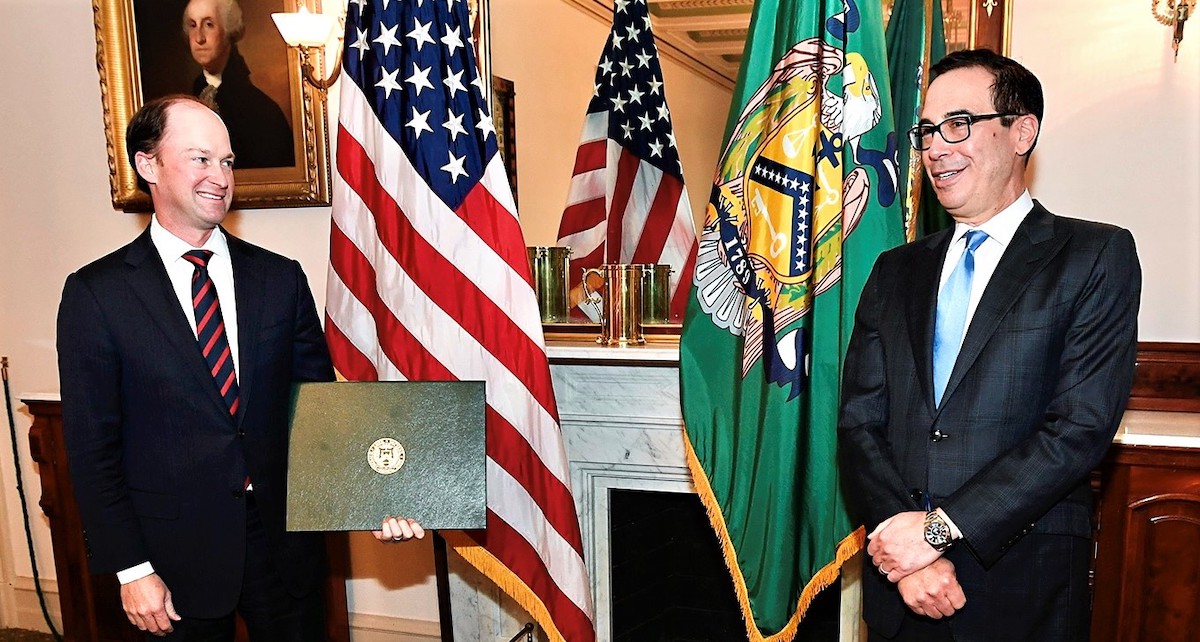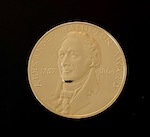Kipp Kranbuhl, MBA ’04: Responding to the Pandemic’s Economic Repercussions at the Treasury Department

When Kipp Kranbuhl, MBA ’04, graduated from the Ross School of Business, his career path initially followed a traditional route in the financial world. But he eventually moved into public service at the U.S. Treasury Department, and he spent much of last year on a once-in-a-lifetime opportunity: serving in the role of the assistant secretary of the treasury for financial markets. In this role, he played a hands-on role in helping the country weather the COVID-19 pandemic.
Kranbuhl had two decades of experience working in the financial markets and securities industry before joining the Treasury Department in 2017 as a deputy assistant secretary. He quickly took on additional responsibilities, serving as acting assistant secretary for two divisions of the department, and was eventually nominated to be assistant secretary for financial markets.
That post required a rigorous confirmation hearing in February 2020 before the U.S. Senate Finance Committee, where Kranbuhl answered an array of challenging questions, many related to fiscal policy. He soon found himself faced with a major challenge: the COVID-19 pandemic that posed an unprecedented threat to the U.S. economy.
Working to Keep the Economy Healthy
In response to the need for a robust fiscal response to protect Americans from looming financial hardships, Kranbuhl worked with others in the Treasury Department to develop a one-and-a-half-page proposal that was presented to Treasury Secretary Steven Mnuchin and, shortly thereafter, Congress. In a matter of weeks, their initial plan evolved into the Coronavirus Aid Relief and Economic Security (CARES) Act, a several-hundred-page relief bill representing more than $6,000 per U.S. citizen of federal support.
During this time, it was also important to steady financial markets through a variety of emergency lending facilities — tools central banks such as the Federal Reserve use to lend capital to public or private financial institutions in times of stress.
“We were working closely with our peers within the federal regulators, including the Federal Reserve and the Securities and Exchange Commission, in order to restore and preserve stability and liquidity,” Kranbuhl said. Through such efforts, the Federal Reserve launched the Paycheck Protection Program Liquidity Facility, the Primary Dealer Credit Facility, the Money Market Mutual Fund Liquidity Facility, the Municipal Liquidity Facility, the Primary and Secondary Market Corporate Credit Facilities, and several others.
“From mid-March through the summer of 2020, we were working on a daily basis, oftentimes around the clock, with our Federal Reserve colleagues in order to establish them,” Kranbuhl said. “Each facility at the Federal Reserve had a separate team, led by a specific Federal Reserve Bank, to lead their efforts.
“A few of us at Treasury worked across all of these facilities, and I was one of them. We were monitoring market conditions and needs, absorbing and responding to stakeholder input, negotiating terms and conditions, and establishing the final parameters for each of the facilities.”
The impact these programs had on the U.S. economy was immense. For instance, the Paycheck Protection Program Liquidity Facility bolstered the effectiveness of the Paycheck Protection Program, which was also established by the CARES Act. According to the Small Business Administration, more than 51 million American jobs were saved by PPP loans in the first several months of the pandemic.

 The transition to a new presidential administration marked the end of Kranbuhl’s time with the Treasury Department. But before he left, Kranbuhl was recognized for the significant contributions he made throughout his nearly four years of public service. At a small, socially distanced ceremony in January, Mnuchin honored Kranbuhl with the Alexander Hamilton Award, the highest honor given by the treasury secretary.
The transition to a new presidential administration marked the end of Kranbuhl’s time with the Treasury Department. But before he left, Kranbuhl was recognized for the significant contributions he made throughout his nearly four years of public service. At a small, socially distanced ceremony in January, Mnuchin honored Kranbuhl with the Alexander Hamilton Award, the highest honor given by the treasury secretary.
One of the accomplishments highlighted on the award certificate was his swift “response to the economic repercussions of the pandemic.”
The Lasting Impact of Lessons from Michigan Ross
As for what’s next, Kranbuhl is weighing his options. He intends to remain in Washington, D.C., but will take a step back from public service for now.
Kranbuhl’s two decades of experience in finance helped him navigate the pandemic’s challenges. Yet he also drew on his Michigan Ross MBA education, where he developed some of the skills he still leans on today.
My professors were sure to reinforce that although we may not always immediately know how to approach challenges that are presented to us, with teamwork, determination, and a bit of ingenuity, we can develop positive solutions and outcomes.
Those are some of the exact qualities that Kranbuhl put into practice as he worked on the Treasury Department’s response to the pandemic. In a very real way, the lessons from Michigan Ross helped overcome an unprecedented challenge not just for Kranbuhl, but for the entire country as well.







